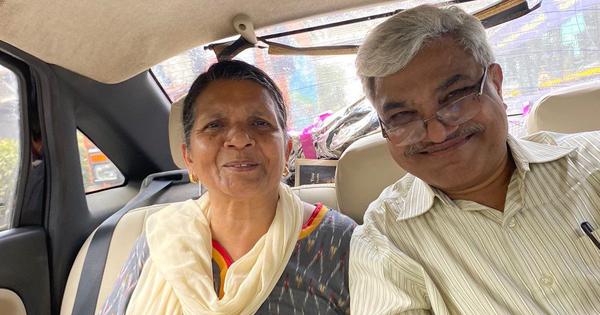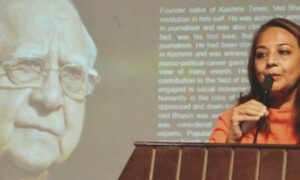
Anand Teltumbde’s The Cell and the Soul: A Prison Memoir stands as one of the most searing indictments of contemporary Indian democracy, transforming personal suffering into a forensic examination of institutional decay. This remarkable work, distilled from 22 of over 100 notes written during his 31 months of incarceration in Mumbai’s Taloja Central Jail, transcends the boundaries of traditional prison literature to become a profound meditation on justice, freedom, and the nature of dissent in Modi’s India.
The memoir opens with a striking paradox: how does a professor of Big Data Analytics, an alumnus of the Indian Institute of Management, and a former corporate executive find himself branded as a dangerous Maoist conspirator? Teltumbde’s initial confession reveals the depth of his naïveté: “I was under the delusion that because of my qualifications, the exalted positions I had held in the corporate world, my impeccable record of integrity and my general public image, I might not qualify for arrest.” This moment of reckoning becomes the entry point for a deeper philosophical inquiry into what kind of democracy imprisons its intellectuals.
Teltumbde’s background as someone who “practised capitalism for the major part of my life” makes his persecution all the more striking. If an individual with such elite credentials can be so easily criminalised, what protection exists for those who lack them? The memoir thus begins not with revolutionary bravado but with genuine bewilderment at the collapse of the very system he had trusted to protect rational discourse.
The transformation from respected academic to “Accused No. 10” in the Bhima Koregaon case serves as a microcosm of how quickly and thoroughly democratic institutions can be weaponised against the freedoms they were designed to protect. Teltumbde’s honest admission that he “wondered if I would be able to endure those conditions” cuts against romanticised notions of prison as a site of political awakening. This vulnerability reveals the memoir’s commitment to truth over ideology, acknowledging that incarceration is, fundamentally, a space designed to break human dignity.
The architecture of oppression
The memoir provides a meticulous documentation of how the state machinery operates to manufacture enemies of democracy. The systematic nature of the campaign against the BK-16 becomes clear through Teltumbde’s account of the orchestrated media blitz that preceded his arrest. Television panels discussing his case were dominated by so-called “Maoist experts” who were revealed to be “unheard of” figures belonging to outfits associated with the Hindu Right group RSS. This manufactured expertise, combined with the premature distribution of allegedly incriminating letters to journalists before court submission, reveals a sophisticated propaganda apparatus designed to poison public opinion before any judicial determination. The technical analysis of the fabricated evidence becomes particularly damning when examined closely. Justice DY Chandrachud’s observation that Sudha Bharadwaj, not being Marathi-speaking, could not have written letters in Devanagari utilising essentially Marathi forms of grammar or address, exposes the absurdly constructed nature of the prosecution’s case. Yet, as Teltumbde recognises, the intention was never conviction but what commentator Ajai Sahni termed “punishment by trial”.
The memoir reveals how the police violated basic legal procedures with impunity. Officers “broke into our house” and “forcibly got duplicate keys to our house from the security,” conducting searches that the Supreme Court would later describe as illegal fishing expeditions. The distribution of alleged evidence to the media before submission to the courts constituted “a grave violation by the police,” yet no officer faced consequences for these transgressions.
Perhaps the most chilling revelation in Teltumbde’s account is the systematic rewarding of misconduct. The Assistant Commissioner of Police, whose conduct violated legal procedures so egregiously that both the Bombay High Court and Supreme Court reprimanded the investigation, was subsequently awarded the Union Home Minister’s Medal for Excellence in Investigation for his work on the Bhima Koregaon case. This institutionalisation of reward for misconduct reveals how deeply the rot has penetrated the system. When Teltumbde attempted to file defamation suits against officers who had blatantly violated the law, the government refused permission. “On what grounds can the government refuse anyone permission to prosecute an officer who had blatantly violated the law, and so egregiously that both the Bombay High Court and the apex court had reprimanded them?” This question cuts to the heart of how legal protections are selectively applied, protecting state agents from accountability while simultaneously prosecuting critics.
The memoir’s examination of prison conditions reveals what Teltumbde calls a “mirror image of society, except that it does not pretend to be free.” His account moves beyond personal catharsis to examine how “time stands still, life is stripped down to its bare essentials” in what becomes “a world unto itself.” The prison emerges as a concentrated expression of the violence and hierarchies that structure society at large. The COVID-19 pandemic provides a particularly stark example of institutional reality distortion. While prisoners contracted the virus, officials insisted there wasn’t a single case due to “excellent management.”
This denial of observable reality within the prison walls serves as a perfect metaphor for the broader pattern of post-truth governance that characterises contemporary authoritarianism. The same callousness that allowed COVID-19 deaths to be underreported in prisons operated at the national level, where the WHO estimated that over 4.7 million people died from the virus, far exceeding government figures. Teltumbde’s observation that “most of the news channels and newspapers, especially in Maharashtra, had sensationalised the letter by organising panel discussions” reveals how media complicity extends beyond mere bias to active participation in manufacturing consent for state persecution. The ecosystem of disinformation operates across institutions, creating what appears to be independent confirmation of fabricated narratives.
Central to Teltumbde’s survival strategy was his commitment to documentation. “Without my penmanship, I could not imagine surviving prison life,” he writes, positioning his memoir within the tradition of prison writings that includes figures like Antonio Gramsci. The act of writing becomes both personal survival and political testimony, transforming individual suffering into collective understanding. The memoir comprises only a fraction of the intellectual output Teltumbde produced during incarceration. His ability to complete four books while imprisoned demonstrates how intellectual freedom persists even under conditions designed to crush it. This productivity under duress suggests that the intended silencing effect of imprisonment can sometimes produce the opposite result, generating more focused and urgent critique of the system responsible for the persecution.
Teltumbde positions the Bhima Koregaon case as “a landmark” in how democracies crush dissent and evolve into neo-fascist states. The case represents what he sees as a new strategy, moving beyond targeted operations like Operation Green Hunt to terrorise dissenting voices across the country. While Operation Green Hunt was “largely confined to the forests of Chhattisgarh,” the Bhima Koregaon case deployed the newly coined oxymoron “urban Naxal” to criminalise anyone who stood up for democracy, the Constitution, and human rights. The memoir traces this evolution within the broader context of Hindutva neo-fascism since the Narendra Modi-led BJP government came to power in 2014. The case becomes a lens through which to examine how democratic institutions can be captured and redirected against democratic values. The absence of clear definitions of targets in both Operation Green Hunt and the Bhima Koregaon case allows for the arbitrary expansion of state violence against any group deemed inconvenient to ruling interests.
Personal tragedy as political commentary
The memoir’s dedication to Teltumbde’s late brother, Milind Teltumbde, adds profound emotional depth to the political analysis. Milind, killed by security forces and branded a Maoist, was ironically also named as a co-accused in the same case that imprisoned his brother. This personal tragedy illuminates the absurdity of state paranoia that treats “one brother in the jungle with one in an IIM classroom as enemies of the state.” The intertwining of personal loss with political persecution reveals how the reach of state violence extends beyond individual targets to encompass entire families and communities. The burden carried by families branded as “Maoist” by the state creates a climate of fear that extends far beyond those directly targeted. “Society looks on with suspicion,” Teltumbde observes, describing the social isolation that accompanies state persecution.
The memoir’s examination of judicial proceedings reveals how courts have become complicit in the erosion of due process. Despite making “all kinds of moralising observations during hearings,” the courts “do nothing against delinquent officers for wilful violation of rules and laws.” This gap between rhetoric and action allows the system to maintain the appearance of justice while systematically undermining its substance. The status of the case, as Teltumbde describes it, captures this dysfunction perfectly. Six of the accused remain in jail, now in their sixth to eighth year, while “discharge petitions are still pending, and charges have not yet been framed.” With 363 witnesses listed by the prosecution, the process will “drag on for years,” ensuring that punishment precedes any determination of guilt or innocence.
The Cell and the Soul succeed not merely as a prison memoir but as an urgent diagnosis of democratic decay in contemporary India. Teltumbde’s assertion that “it was my pursuit to make the world a better place that landed me in prison” encapsulates the moral gravity of a system that criminalises conscience. The memoir reveals that in today’s India, free thought itself has become a seditious act. By documenting this transformation with scholarly precision and personal honesty, Teltumbde has created an essential text for understanding how quickly and systematically democratic institutions can be captured and redirected against democratic values. The book stands as both a warning and a call to action, reminding us that the health of any democracy can be measured by how it treats its dissenting voices. In that regard, Teltumbde’s account suggests that Indian democracy requires urgent intervention before its condition becomes terminal.
The Cell and the Soul: A Prison Memoir, Anand Teltumbde, Bloomsbury India.
📰 Crime Today News is proudly sponsored by DRYFRUIT & CO – A Brand by eFabby Global LLC
Design & Developed by Yes Mom Hosting






